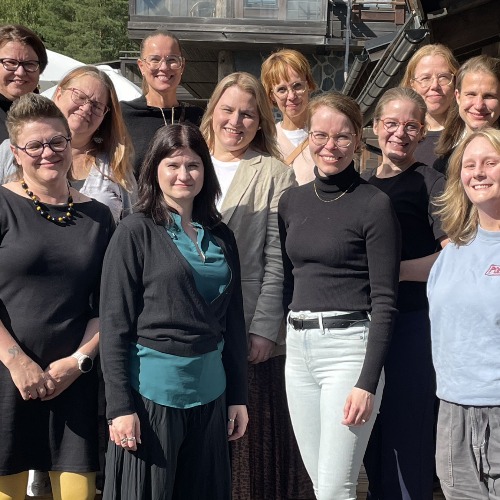
Old-age social exclusion in home care - prevalence, meanings & intervention (SOLDEX)
Funders

SOLDEX-project scrutinizes older people’s formal home care from the perspective of social exclusion. The project examines the prevalence, associate factors and individual meanings of social exclusion in home care clients and how old-age exclusion is addressed in current ageing policies and legislation. The multidisciplinary study combines expertise of social gerontology, elder law and health economics and is divided into three Work Packages utilizing both quantitative and qualitative methods. In addition to a survey and qualitative interviews, a quasi-experimental trial is conducted to examine the effectiveness of the “day activity service” for older home care clients. The results provide evidence-base for the development of home care practices, legislation and elder care services.
Leaders
STUDY DESCRIPTION
In the research project, we explore old-age social exclusion through five overlapping domains: economic exclusion, exclusion from social relations, exclusion from services, community and spatial exclusion, and civic exclusion. As a cross-cutting theme, we examine older home care client’s social exclusion from the perspective of access to justice, including self-determination and the accessibility of services, for example.
In Work Package 1, we examine the prevalence and associated factors for social exclusion in older home care clients using survey and administrative data. The survey data was collected in 2022 among home care clients aged 65 living in two different research areas. As administrative data, we use the clients’ functional ability assessments and information about the use of services.
In Work Package 2, we examine meanings and experiences related to social exclusion and living at home for the older home care clients. In addition, we look at how home care and being a home care client builds and shapes the everyday lives of older people. Qualitative data was collected by interviewing home care clients and their informal carers.
In Work Package 3, we examine the effectiveness and cost-effectiveness of day care activities for the older home care clients using a multi-method quasi-experimental research design. Effectiveness is examined from the perspectives of inclusion, loneliness and quality of life related to social services. We also evaluate the intervention process and examine the obstacles and incentives for its implementation.
Cooperation
-
 House of Effectiveness 01.11.2018 -
House of Effectiveness 01.11.2018 - -
 Center of Law and Welfare 01.01.2018 -
Center of Law and Welfare 01.01.2018 - -
 Neuro-Ethics and Law Research Team 01.08.2020 -
Neuro-Ethics and Law Research Team 01.08.2020 -
Files
3 items-
Tietosuojaseloste kysely- ja haastatteluaineistoille
pdf -
Tietosuojaseloste media-aineistolle
pdf -
Hankkeen päätösseminaarin esitys 21.8.2025
pdf
Keywords
Leaders
Professors
-

Anna Mäki-Petäjä-Leinonen
ProfessorLaw School, Faculty of Social Sciences and Business Studies -
Leena Forma
Research DirectorDepartment of Health and Social Management, Faculty of Social Sciences and Business Studies
Post-doctoral Researchers
-

Hanna Ristolainen
University LecturerDepartment of Social Sciences, Faculty of Social Sciences and Business Studies -

Marjo Ring
Senior ResearcherDepartment of Social Sciences, Faculty of Social Sciences and Business Studies -

Henna Nikumaa
Postdoctoral ResearcherLaw School, Faculty of Social Sciences and Business Studies
Doctoral Researchers
-

Catherine Suubi Kayonga
Doctoral ResearcherDepartment of Social Sciences, Faculty of Social Sciences and Business Studies -

Kalle Saarinen
Doctoral ResearcherDepartment of Social Sciences, Faculty of Social Sciences and Business Studies
Research Assistant
Publications
16 items-
Association Between Social Support and Quality of Life: Cross-Sectional Study Among Older Adults Receiving Home Care Services in Finland
Kayonga, Catherine Suubi; Ristolainen, Hanna; Lisko, Inna; Mäki- Petäjä-Leinonen, Anna; Tiilikainen, Elisa, 2025, Home health care management and practice, [Epub ahead of print 27 Oct 2025], 1-8. A1 Journal article (refereed), original research -
Images of formal home care in Finnish newspapers – a social representations approach
Ristolainen, Hanna; Martikainen, Jari; Tiilikainen, Elisa, 2025, International journal of ageing and later life, [Published: Aug 22, 2025], 1-33. A1 Journal article (refereed), original research -
Resistant, adaptive, and supported agency – Examining narratives of Finnish older home care clients
Ring, Marjo; Villar, Feliciano; Ristolainen, Hanna; Tiilikainen, Elisa, 2025, Journal of aging studies, 75, 101342. A1 Journal article (refereed), original research -
Social Exclusion Perspective on Loneliness in Later Life
Van Regenmortel, Sofie; Tiilikainen, Elisa; Ristolainen, Hanna; Burholt, Vanessa; Dahlberg, Lena, 2025, Aartsen, Marja; Precupetu, Iuliana; Suanet, Bianca, Macro Social Influences on Loneliness in Later Life : Towards a Better Understanding of the Loneliness Paradox in Europe, 63-86. A3 Book section, Chapters in research books -
Social Exclusion in Gerontological Social Work: Examining Older Clients’ Life Situations Through a Multidimensional Framework
Tiilikainen, Elisa; Rossi, Eeva; Seppänen, Marjaana, 2025, The journal of aging and social change, 15, 1, 77-97. A1 Journal article (refereed), original research -
Syrjintä muistisairaiden ihmisten arjessa
Issakainen, Mervi; Teerikangas, Minni; Tiilikainen, Elisa, 2025, Ervasti, Kaijus; Obstbaum, Yaira; Lindgren, Minna, Hyvinvointivaltion varjoissa : Muistisairaiden ihmisten oikeuksien toteutuminen, 145-163. A3 Book section, Chapters in research books -
Early-life circumstances and late life loneliness trajectories among Finnish older adults
Tiilikainen, Elisa; Aartsen, Marja; Kraav, Siiri-Liisi, 2024, Bmc geriatrics, 24, 1, 459. A1 Journal article (refereed), original research -
From Restricted Resources to Ethical Burden - Former Home Care Workers’ Reasons for Leaving Their Jobs
Ring, Marjo; Ristolainen, Hanna; Tiilikainen, Elisa, 2024, Journal of applied gerontology, 43, 8, 1111-1119. A1 Journal article (refereed), original research -
Interventiotutkimuksen toteuttaminen sosiaalipalveluissa
Ristolainen, Hanna; Isoniemi, Henna; Moisio, Meri; Tiilikainen, Elisa, 2024, Janus: sosiaalipolitiikan ja sosiaalityön tutkimuksen aikakauslehti, 32, 2, 218-225. B1 Non-refereed journal articles -
Kotihoito on jo nykyisellään riittämätöntä – ikääntyvien palveluista säästäminen lisää inhimillisiä kustannuksia
Tiilikainen, Elisa; Ristolainen, Hanna, 16.09.2024, Puheenvuoroja - Itä-Suomen yliopiston toimijoiden puheenvuoroblogi. E1 Popularised article, newspaper article


